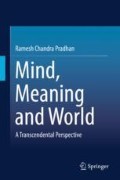Abstract
In this chapter I will discuss Wittgenstein’s views on self, meaning and world in an attempt to bring out the connections between self, language and the world within a transcendental framework. Wittgenstein has opted for a transcendental way of bringing out the connections between language and logic on the one hand and the world on the other. From his early philosophy in the Tractatus (Wittgenstein 1961a) and to his later philosophy in the Investigations (Wittgenstein 1953, 2009), he has pursued a method of understanding language and the world which can be called transcendental (Shwayder 1969: 66–70; Stenius 1960; Pradhan 2008). Though he calls his early philosophy transcendental, he calls his later philosophy grammatical (Wittgenstein 1953, 2009) in nature. However, we can consider Wittgenstein as a transcendental philosopher in general as he has given up the empiricist and the naturalist way of interpreting language and the world.
Access this chapter
Tax calculation will be finalised at checkout
Purchases are for personal use only
References
Chandra, S. (2002). Wittgenstein: New perspectives. New Delhi: Indian Council of Philosophical Research.
Frege, G. (1952). On sense and reference. In Philosophical writings (P. Geach & M. Black, Trans.). Oxford: Basil Blackwell.
Frege, G. (1979). Posthumous writings (H. Hermes et al., Trans.). Oxford: Blackwell.
Hacker, P. M. S. (1972). Insight and illusion: Wittgenstein on philosophy and the metaphysics of experience. Oxford: Clarendon Press.
Hintikka, J. (1966). On Wittgenstein’s solipsism. In I. M. Copi & R. W. Beard (Eds.), Essays on Wittgenstein’s Tractatus. London: Routledge and Kegan Paul.
Lear, J. (1986). Transcendental anthropology. In P. Petit & J. McDowell (Eds.), Subject, thought and context. Oxford: Clarendon Press.
McDowell, J. (1994). Mind and world. Cambridge, MA/London: Harvard University Press.
Morris, M. (2008). Wittgenstein and the Tractatus Logico-Philosophicus. London/New York: Routledge.
Pitcher, G. (1972). The philosophy of Wittgenstein. New Delhi: The Prentice-Hall of India, Private Ltd.
Pradhan, R. C. (2003). The great mirror: An essay on Wittgenstein’s Tractatus. New Delhi: Kalki Prakash.
Pradhan, R. C. (2008). Language, reality and transcendence: An essay on the main strands of Wittgenstein’s later philosophy. Boca Raton: Brown Walker Press.
Quine, W. V. (1960). Word and object. Cambridge, MA/London: Harvard University Press.
Schopenhauer, A. (1958). The world as will and representation, Vol I (E. F. J. Payne, Trans.). New York: Dover Publications, Inc.
Schwayzer, H. (1986). Thought and reality: The metaphysics of Kant and Wittgenstein. In S. Shanker (Ed.), Ludwig Wittgenstein: Critical assessments (Vol. II). London: Croomhelm.
Shwayder, D. S. (1969). Wittgenstein on mathematics. In P. Winch (Ed.), Studies in the philosophy of Wittgenstein. London: Routledge and Kegan Paul.
Sluga, H. (1996). Whose house is that? In H. Sluga & D. G. Stern (Eds.), The Cambridge companion to Wittgenstein. Cambridge: Cambridge University Press.
Spinoza. (1955). Ethics (R. H. M. Elves, Trans.). New York: Dover Publications, Inc.
Stenius, E. (1960). Wittgenstein’s Tractatus: A critical exposition of its main lines of thought. Oxford: Basil Blackwell.
Strawson, P. F. (1966). The bounds of sense: An essay on Kant’s critique of pure reason. London: Methuen.
Williams, B. (1974). Wittgenstein and Idealism. In G. Vesey (Ed.), Understanding Wittgenstein (Royal Institute of Philosophy Lectures Vol. 7). London: MacMillan.
Wittgenstein, L. (1953). Philosophical investigations (G. E. M. Anscombe, Trans.). Oxford: Basil Blackwell.
Wittgenstein, L. (1956). Remarks on the foundations of mathematics (G. E. M. Anscombe, Trans.). Oxford: Basil Blackwell.
Wittgenstein, L. (1961a). Tractatus Logico-Philosophicus (D. F. Pears, & B. F. McGuinness, Trans.). London: Routledge and Kegan Paul.
Wittgenstein, L. (1961b). Notebooks-1914-1916 (G. E. M. Anscombe, Trans.). Oxford: Blackwell.
Zemach, E. (1966). Wittgenstein’s philosophy of the mystical. In I. M. Copi & R. W. Beard (Eds.), Essays on Wittgenstein’s Tractatus. London: Routledge and Kegan Paul.
Author information
Authors and Affiliations
Rights and permissions
Copyright information
© 2019 Springer Nature Singapore Pte Ltd.
About this chapter
Cite this chapter
Pradhan, R.C. (2019). Wittgenstein on Self, Meaning and World. In: Mind, Meaning and World. Springer, Singapore. https://doi.org/10.1007/978-981-13-7228-5_1
Download citation
DOI: https://doi.org/10.1007/978-981-13-7228-5_1
Published:
Publisher Name: Springer, Singapore
Print ISBN: 978-981-13-7227-8
Online ISBN: 978-981-13-7228-5
eBook Packages: Religion and PhilosophyPhilosophy and Religion (R0)

